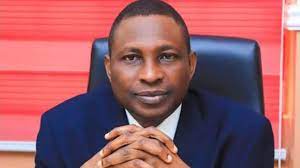How Nigeria improved anti-corruption fight, economy in 1 year – Olukoyede
The Economic and Financial Crimes Commission (EFCC) has said that Nigeria made significant progress in the fight against corruption, which strengthen the economy over the past year, despite global perceptions to the contrary. The EFCC Chairman, Mr Ola Olukoyede, said this in Abuja at the public presentation of the 25-page Report on the Review of […]

The Economic and Financial Crimes Commission (EFCC) has said that Nigeria made significant progress in the fight against corruption, which strengthen the economy over the past year, despite global perceptions to the contrary.
The EFCC Chairman, Mr Ola Olukoyede, said this in Abuja at the public presentation of the 25-page Report on the Review of Transparency International’s Corruption Perception Index (TI-CPI) Assessments for 2019-2024, organised by the Technical Unit on Governance and Anti-Corruption Reforms (TUGAR) in Abuja.
He said that Nigeria in the last one year has strengthened its anti-corruption efforts, citing the financial autonomy granted to local government areas through a Supreme Court ruling as a key example.
He said that the financial autonomy is a significant achievement that has yet to receive the international recognition it deserves.
According to him, it was a legislative intervention this year that culminated in the increase of the allocations to the anti-graft agencies to operate independently.
He said that it was unprecedented for any country to seize 700 apartments as the EFCC did last year, apart from arrest of 790 suspects, including foreigners from a single operation.
Earlier, the Head of TUGAR, Mrs. Jane Onwumere said the Technical Unit on Governance and Anti-Corruption Reforms (TUGAR) being a research, monitoring and evaluation unit was set up to respond to the critical need for a rigorous approach to policy making grounded on empirical data collection and analysis, and in-depth country specific diagnostics on corruption and related governance issues.
She said that the work of the TUGAR includes conducting comprehensive diagnostic studies, deep analytical work, monitoring and evaluating anti-corruption and governance initiatives, constructing of governance indicators, and developing policy briefs on various governance issues for informing policymakers and driving sustainable reforms.
The report noted that the review of Nigeria’s Corruption Perception Index (CPI) 2019-2024, said recorded no overall change in her scores.
It said Nigeria recorded a CPI score 26 in 2019, ranking 146 out of 180 countries.
In 2024, said the review, Nigeria achieved the same CPI score of 26, and ranked 140 out of 180 countries, which represents the highest score for the period under review.
“On a yearly basis, Nigeria’s CPI score fell slightly from 26 in 2019 to 25 in 2020. It fell further to 24 in 2021. The country’s score remained unchanged in 2022 before increasing to 25 in 2023 and further to 26 in 2024.
“This puts the country in the third lowest decile (i.e. Nigeria recorded less than a third of the total achievable score) in the CPI ranking, implying high levels of corruption. Nigeria’s persistent low CPI scores and subsequent low ranking amongst other countries shows little improvement over this 6- year period,” the report said.
